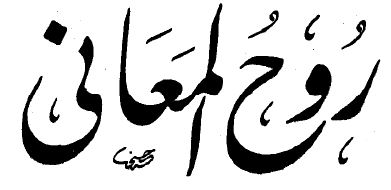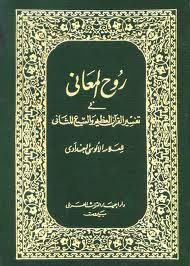


Images of editions of the Tafsir al-Ālūsī
الآلوسي
Sayyid Maḥmūd ibn ‘Abd Allāh al-Ḥusaynī al-Ālūsī al-Baghdādī (10 December 1217/1802 - d. 25th Dhu'l Qa'da 1270/ July 29th 1854).
A Note on Abū al‑Thanā’, Shihāb al‑Dīn al‑Ālūsī and his Tafsir (Qur'an Commentary) :
Rūḥ al-ma‘ānī fī tafsīr al-Qur’ān al-‘aẓīm wa-al-sab‘ al-mathānī
Stephen Lambden UC Merced.
In Progress. Last uploaded and corrected 24-07-2018.
The huge and widely‑respected early 19th century commentary of the `Alīd Sunnī Abū al‑Thanā’, Shihāb al‑Dīn al‑Ālūsī (d.1270 /1854) entitled Rūḥ al‑ma`āni fī tafsīr al‑qur’ān al‑`aẓīm.. (The Spirit of the Meaning in Commentary upon the Mighty Qur’ān) is perhaps his remaining claim to fame. Written in the 1200s/ 1800s this Tafsir work has been published in Egypt in six volumes in Cairo (Cairo: al‑Maṭba`at al‑Amīrah, 1870; Bulaq 1301‑10/1883‑92 and also recently reprinted).A one‑time muftī of Baghdad, Ālūsī was aware of both early Shaykhism and Bābism. Sayyid Kāẓim Rashtī the second Shaykhī leader (see Ch. 6.1f) appears to have corresponded with him (Fihrist:323 No. 256; Nicolas, Essai II:35 no. 100). Though Ālūsī condemned Bābī heresy at the time of the trial of Mullā `Alī Bastāmī (d. Istanbul, 1846), the Bāb invited him to embrace his religion in an Arabic letter written from Mākū (1848) in which he claimed divinity and to be the awaited Mahdī: "I, verily, am God, no God is there except I myself, I manifested myself on the Day of Resurrection... I am the Mahdī" (Zā’im al‑Dawlā, Miftāḥ, 212‑15). For a few months in the early 1850s, Alūsī accommodated under house arrest the learned and revolutionary female Bābī, Fāṭima Baraghānī, better known as Ṭāhira (d.1270/1852) who may also have had a role in the evolution of Bābī‑ Bahā’ī missions to the Jews its emergent bible exegesis (Āyatī, Kawākib 1:118; Mazandarānī, ZH 6:703‑4). Ālūsī’s commentary and other writings apparently contain passing reference to the first two Shaykhī leaders as well as to the Bāb and Ṭāhira whom he is said to have greatly admired (cf. Noghabā’ī, 1983: 137). I have not been able to locate these references in either the edition printed in or the CD version though the Arabic text is cited by Noghabā’ī. This Bahā’ī writer has Alūsī refer to ÿāhirih as "one in whom I witnessed grace and perfection the like of which I had not perceived in most men" (1983:137). See also Gulpayigānī, Kashf al‑Ghiṭa, 95‑6; Māzandarānī, ZH III:356‑9; `Abd al-Baha' Tadhkirat, 194/ Memorials, 194‑5). See further:
- Rūḥ al-ma‘ānī fī tafsīr al-Qur’ān al-‘aẓīm wa-al-sab‘ al-mathānī = روح المعاني في تفسير القرآن العظيم والسبع المثاني
- 1-30 in 15 volumes set, Ed, Muhammad al-Amad + Omar al-Salami Beirut:: Dar Ihia al-Turath al-Arabi-Library.
- cf. http://www.livingislam.org/k/strm_e.html
The Rūḥ al‑ma`ānī is a wide‑ranging compendium of pre‑19th century Islamic tafsīr works. While isnād details are registered sparingly select Shī`ī and some mystical perspectives are sometimes recorded. Al‑Alūsī’s occasionally modernistic commentary shows some knowledge of the Bible. It exhibits a traditional yet ecumenical viewpoint registering a wide range of opinions (Smith, 1970:2251‑9).
An example of the theological depth of al‑Alūsī may be briefly referred to here. The story of Moses’ request to see God (Q. 7:143), for example, is discussed at length (Rūḥ 5:43‑52). Attention to detail is evident in the comments upon the alwāḥ (Tablets) which God gave to Moses on Sinai (al‑ṭūr). Expounding the words, "And We wrote from him [Moses] upon the alwāḥ (Tablets) something of everything (min kulla shay’ ; Q. 7:145a) Alūsī records various opinions as to the number of alwāḥ, their jawhar (substance), their miqdār ( measure, scope) and their kātib (inscriber):
"[Regarding] their number, it is said that there were ten and [also that there were] seven or two... the alwāḥ were [made of] green emerald (zumurrud akhḍar). The Lord, exalted be He, commanded Gabriel and he brought them from [the Garden of] Eden... Others say that they were [made] of ruby.. And I say that they were of emerald.. It is related from the Prophet, `The alwāḥ which were sent down unto Moses were from the Lote‑Tree of Paradise (sidr al‑jannat) and the length of the Tablet(s) was twelve cubits" (Rūḥ al‑ma`ānī V:55).



